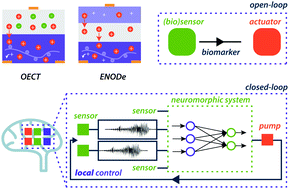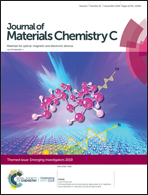Towards organic neuromorphic devices for adaptive sensing and novel computing paradigms in bioelectronics
Abstract
Bioelectronics has made enormous progress towards the development of concepts, materials and devices that are capable of sensing, monitoring and controlling a biological environment, by incorporating concepts such as local drug delivery and electrical, chemical or mechanical stimulation. Nevertheless, fully autonomous bioelectronic applications demand not only the acquisition of biological signals, but also local low power data processing, storage and the extraction of specific features of merit. Here, we present an overview of the latest studies on organic neuromorphic and sensing devices. We also speculate on the need for smart and adaptive sensing and highlight the potential of these concepts to enhance the interaction efficiency between electronics and biological substances.

- This article is part of the themed collection: Journal of Materials Chemistry C Emerging Investigators


 Please wait while we load your content...
Please wait while we load your content...